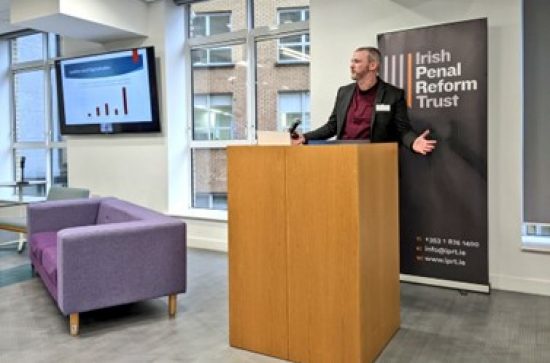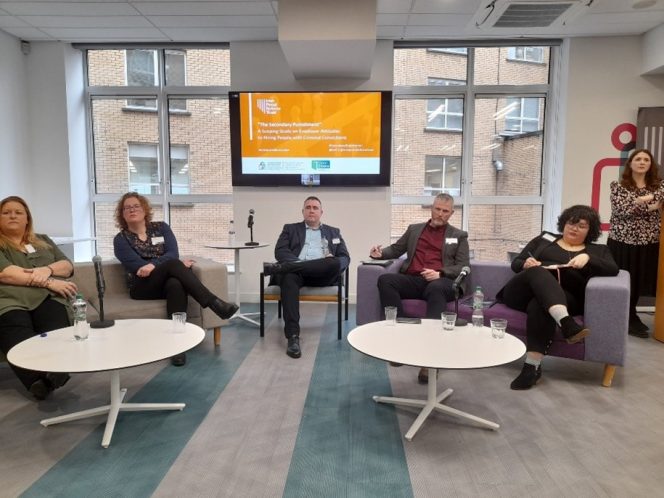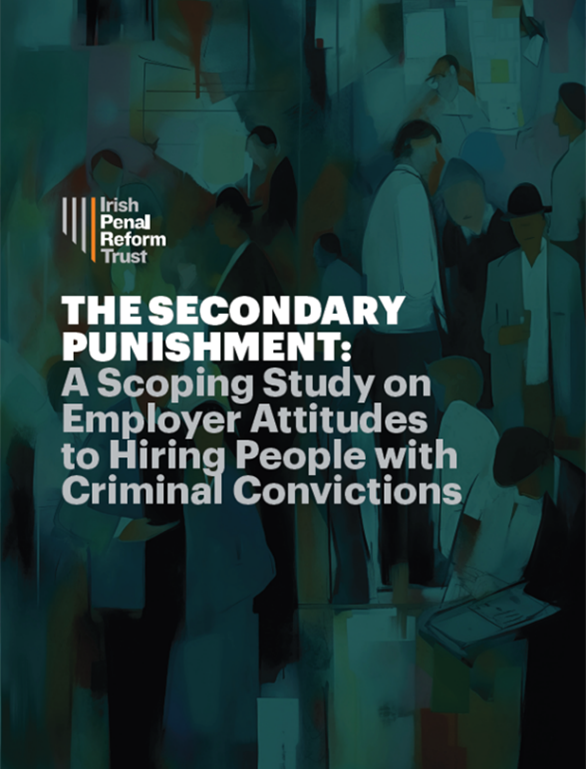
Dr Joe Garrihy and Dr Ciara Bracken-Roche launch the report: “The Secondary Punishment”: A Scoping Study on Employer Attitudes to Hiring People with Criminal Convictions (School of Law and Criminology, Maynooth University).
On the 8th of February 2024, the Irish Penal Reform Trust (IPRT) launched a new study exploring the attitudes of employers in Ireland to hiring people with criminal convictions. The report presented the findings of a multi-method study, comprised of interviews with employers and people with convictions, survey data, and a participatory symposium. The research was funded by the IPRT through funds awarded through the Irish Human Rights and Equality Commission Gant Scheme 2022 and further supported by The Open Doors Initiative.

The report was presented by Dr Joe Garrihy and Dr Ciara Bracken-Roche from the School of Law and Criminology, Maynooth University who carried out the study and co-authored the report.
The report examines the attitudes of employers in Ireland to hiring people with convictions(s) (PWCs) and the experiences of PWCs in employment. Employment remains a key protective factor on the desistance journey and supports the development of an inclusive, fair, and equal society (Carr et al., 2015; Healy, 2017; Reich, 2017). Successful reintegration can partially be measured by employment outcomes for PWCs (Ramakers, 2021).
There is evidence that employers are broadly open to hiring PWCs, but raise concerns based on perceptions of risk in doing so. The absence of guidance and uncertainty about evidence-based approaches and legal requirements leads to inconsistent policies and practices while PWCs continue to face intersecting barriers to employment and reintegration. This report draws on a multi–method study of employers’ attitudes to hiring PWCs and experiences of employment pathways for PWCs, comprised of a survey (n = 55), interviews (n = 23), and a participatory symposium of key stakeholders in the summer of 2023. The report presents 10 recommendations based on the key findings listed below.
- Perceptions of risk without an evidence base underpinned employer concerns about hiring PWCs including but not limited to safeguarding, reputational damage, reoffending, personality, qualifications, job performance and lack of support.
- Opportunities for progress emerged, with employers broadly willing to hire PWCs, but seeking guidance, information, and support to do so.
- Half of the survey participants did not have specific policies or practices that require disclosure of criminal convictions but Garda Vetting and GDPR requirements are not clearly understood by all employer participants or PWCs.
- Persistent barriers to employment for PWCs include stigma, lack of transparency in hiring processes, demands on resilience, motivation and desistance, and narrowing job opportunities.
- The imperative of shifting mindsets from moral censure to inclusive policies and practices was highlighted, with the need for clear communication and messaging.

The report forms part of the ongoing line of inquiry into reintegration for people with convictions through inclusive hiring in the labour market and admissions to higher education institutions. The next output will comprise a bespoke toolkit for employers to provide information, guidance and support for inclusive hiring policies and practices for people with convictions with The Open Doors Initiative on May 2nd 2024.
Read the report in full here.
For more information on the study and media coverage of the event see below:
"The Secondary Punishment": Employers and people with convictions reveal barriers to employment | Irish Penal Reform Trust (iprt.ie)
Round-up: "The Secondary Punishment”: A Scoping Study on Employer Attitudes to Hiring People with Criminal Convictions | Irish Penal Reform Trust (iprt.ie)
‘I can’t change my past’ - Former prisoner on facing rejection and helping others | Newstalk
‘Conviction for crime should not mean ‘a lifetime of discrimination’ |Irish Times

